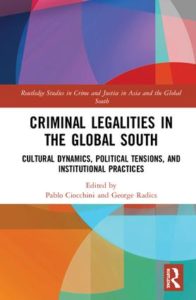Criminal Legalities in the Global South. Cultural Dynamics, Political Tensions, and Institutional Practices
Criminal Legalities in the Global South: Cultural dynamics, political tensions and institutional practices
| Year | : | 2019 |
|---|---|---|
| Author/s | : | Wilson Hernández |
| Area/s | : | Ethnicity, gender and citizenship |
Hernández, W. (2019). Sacrificing justice for efficiency? Examining premature dismissal rates in Peruvian corruption cases. En P. Ciocchini & G. Radics (Eds.), Criminal Legalities in the Global South: Cultural dynamics, political tensions and institutional practices. Abingdon: Routledge.
In Peru, corruption is widespread. Under the intention of addressing the problem of corruption, the justice system reacted by creating a specialized sub judicial system, which accompanied the introduction of a new Criminal Procedure Code that allowed less bureaucratic oral criminal proceedings. While these changes promised justice and efficiency, in this chapter it is argued that in the search for efficiency, justice itself was sacrificed because the undue file of corruption complaints was encouraged. Specifically, the determinants that increase the probability that a corruption complaint is improperly filed are explored. Three types of determinants were differentiated (characteristics of the complaints, of the work of the prosecutors and of the case), being that they are the characteristics of the fiscal work (not addressing all the evidence, lack of coherence in the taking of information of the complaint and lack of clarity in the argumentation of the archiving) those that exert a greater weight in the probability of improper archiving.






